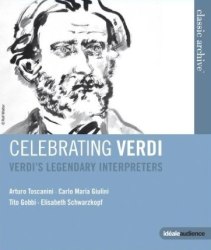| 
|
Giuseppe VERDI (1813-1901)
Celebrating Verdi - Verdi’s Legendary Interpreters
Detailed contents list at end of review
Picture format: 1080i HD - 16:9 (HD upscale). All in monochrome
Sound format: PCM Stereo, dts-HD Master 5.1
Subtitles: English, German, French
Booklet notes: English, German, French
also available on DVD (3079088)
IDEALE AUDIENCE 3079084  [58:00]
[58:00]
At the very start of this disc we see Arturo Toscanini conducting the overture to La Forza del Destino. He famously played in the orchestra at the premiere of Otello, Verdi’s penultimate operatic work, on the night of 5 February 1887. Verdi composedLa Forza del Destino shortly after he was elected to a united Italy’s first National Parliament. It was written in response to a commission for St. Petersburg. The premiere was delayed by a year due to the indisposition of the leading soprano and with no readily available substitute. Its long melodic lines are given dramatic power by Toscanini’s sometimes frenetic tempi but this is at the expense of some of their innate beauty. Forget about stereo or up-scaling as the single microphone and transmission equipment shows. Nonetheless, the sound is good; likewise the picture.
Toscanini’s stick technique is rigid and use of the left hand variable. It is utterly different to that of Carlo Maria Giulini. With eyes closed at times, and wide open and nearly mesmeric at others, he seeks to draw out the beauty of the lines in the overture to I vespri siciliani. Originallycomposed under the French title Les Vêpres Siciliennes, and premiered in Paris in 1855, this is the longest of any of Verdi’s overtures (CH.2). The same near-spirituality of Giulini’s approach on the rostrum is also well shown in the Stabat Mater, the second component of Verdi’s Four Sacred Pieces - a work he composed for his own pleasure during his final years (CH.3). Not himself a believer, Verdi nevertheless invests the music with reverence and Giulini draws a beautifully moving performance from the choir and orchestra.
The sung operatic contributions start with Tito Gobbi costumed and looking suitably grumpy after having been tipped into the Thames from Alice Ford’s laundry basket (CH.4). Gobbi was the outstanding singing actor among all the post-Second World War Italian baritones. His tone is not mellifluous or well covered or extensively coloured. These were not limitations to him as he could create a character with his voice to which he added consummate acting skills. This is evident in the vicious malevolence he brings to Iago’s Credo from the second act of Otello (CH.5). The opera represented a significant change in style for Verdi. A group of friends including his publisher, Ricordi, had subtly persuaded him to wield his pen again after a gap of over ten years since the premiere of Aida. He took his time in the composition which in style represents a significant change. It is more through-composed than his earlier works with their adherence to recitative, aria and cabaletta structure and chorus interludes. With Charles Mackerras, a consummate Verdian on the rostrum, these two tracks are highlights of this issue.
Of these extracts Elisabeth Schwarzkopf in Desdemona’s act four duo of the Willow Song and Ave Maria from Otello I find the least convincing as well as the poorest visually. I do not know if she ever sang the role on stage, but here, whilst attempting to be involved she seems curiously ill at ease vocally and does not spin Verdi’s vocal lines as I might have expected.
The box for this disc claims 1080i Full HD in 16:9 aspect. The only time the picture filled my standard widescreen TV was for the bright green coloured introduction to each item, which then played with the usual black bands down the side of the screen as is normal with 4:3 aspect.
In summary then: a compilation of historical performances in black and white. Giulini’s conducting, some outstanding choral singing and Gobbi’s expressive vocal and acted characterisations make this a worthwhile purchase.
Robert J Farr
Detailed Contents List
La forza del destino - Overture
NBC Symphony Orchestra/Arturo Toscanini [7.14]
rec. USA, 1943
I vespri siciliani (1855) - Overture [9.35]
New Philharmonia Orchestra/Carlo Maria Giulini
rec. Fairfield Hall, Croydon, 12 January 1968
Stabat Mater from Quattro Pezzi Sacri (1898)[12.43]
New Philharmonia Orchestra and Chorus/Carlo Maria Giulini
rec. Fairfield Hall, Croydon, 3 March 1968
Falstaff (1893)
Eh! Taverniere ... Mondo ladro
Tito Gobbi (baritone) [5.57]
London Symphony Orchestra/Charles Mackerras
BBC Studio, London, 16 May 1958
Otello (1887)
1. Vanne, la tua meta gia vedo ... Credo in un Dio crudel
Tito Gobbi (baritone) [5.05]
London Symphony Orchestra/Charles Mackerras
BBC Studio, London, 16 May 1958
2. Willow Song and Ave Maria. [15.04]
Elisabeth Schwarzkopf (soprano)
Orchestre National de L’ORTF/Berislav Klobucar
rec. Salle Pleyel, Paris, 1967
 |
 |
|



 All Nimbus reviews
All Nimbus reviews








